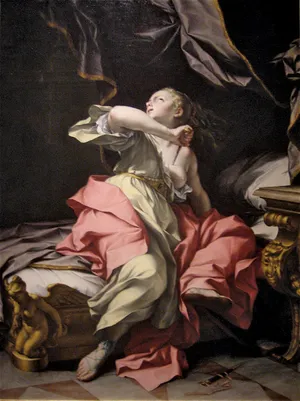The Rape of Lucretia was the tipping point of the Roman Revolution. As we learned in our sources for this week, Romans had values and honors that reflected traits essential to the Roman Empire. This story was written in 509 B.C. It is unclear how accurate this retelling is. It should be noted that the author, Livy, favored the Roman Empire. The story of the Rape of Lucretia occurred hundreds of years before it was retold by Livy. This can make the truth of his writings questionable. Livy emphasizes the need for a change from the rulings of a king with the retelling of this historical event. In Rome at this time, there was order/rules of personal life that weaved into public life. Men held power as the heads of each family. Women were considered less, and the men had control over them. Lucretia was known for her beauty and moral actions. She was the wife of Collatinus. Tarquinius was the son of King Tarquin. In a check-in on the wives, it was noted that Lucretia was the most honorable. Tarquinius returns to the home of Collatinus and Lucretia. She was an honorable woman. She allowed him in her home with respect. He took advantage of this. On his return, Tarquinius threatened Lucretia by saying he would dishonor her. The act of rape was not only a sexual violation but also an abuse of power. The power that kings and rulers had over commoners. This act made Lucretia feel she could not go on. She was a woman without honor. She contacted her father and her husband, Collatinus. They arrived along with Brutus, her uncle. She asked for them to kill him. They agreed. Sadly, Lucretia took out a knife and killed herself. She did not want her story to be someone else’s excuse for dishonor. Brutus took it upon himself to rid Rome of the king, his wife, and children. He proclaimed that he would never tolerate kings in Rome. The people of Rome were angered at the actions of the king’s son. This turn of events is the movement from a monarchy to a republic government.

Leave a Reply